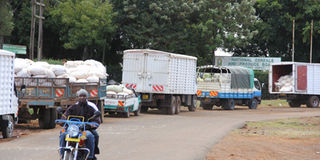New regulator may take over from NCPB

Trucks loaded with maize queue at the National Cereals and Produce Board, Eldoret depot on December 05, 2013. A major overhaul of grain production, storage and marketing might be in the works if the recommendations of a consulting firm are implemented. PHOTO | JARED NYATAYA | FILE |
What you need to know:
- Ernst & Young, which was appointed to restructure the loss-making National Cereals and Produce Board (NCPB), has proposed the establishment of a Grain Sector Regulator.
- The government owes the cereals board Sh6 billion, part of which was incurred in 2002 when, due to an executive order, it sold maize at a lower price than it had bought it.
A major overhaul of grain production, storage and marketing might be in the works if the recommendations of a consulting firm are implemented.
Ernst & Young, which was appointed to restructure the loss-making National Cereals and Produce Board (NCPB), has proposed the establishment of a Grain Sector Regulator.
In its report, it further recommends that the NCPB should be turned into a commercial entity, under the Government Investment Corporation.
Ensure compliance
The regulator would facilitate grain production, conduct research on handling technology, support a competitive and efficient grain sector, and protect producers, traders, and consumers, according to the report.
Further, it would maintain and disseminate grain market information, supervise and license market players and ensure compliance with relevant standards, rules and regulations.
The problems at the NCPB are a result of lack of such a regulator, says the audit firm consultants.
The government owes the cereals board Sh6 billion, part of which was incurred in 2002 when, due to an executive order, it sold maize at a lower price than it had bought it.
The report says the grain sector has been neglected for long without a regulator, causing its current problems.
It faults the existing arrangement of management of the strategic grain reserve through trustees, which it says has not been able to ensure food security.
“We recommend the establishment of National Food Security Agency (Nafosa) whose main aim is to solve the problems of food insecurity,” the report says.





